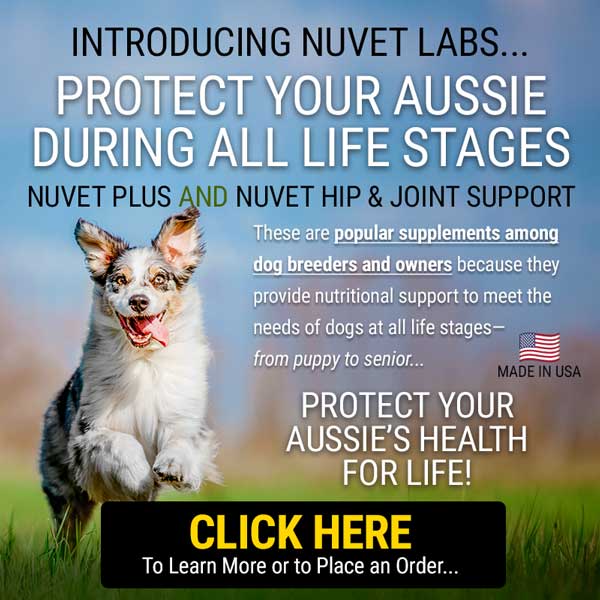
Understanding Dog Food Nutrition Labels
Dog food nutrition content varies greatly. A dog's nutritional needs vary, as well. Active high energy breeds like the Australian Shepherd require more calories, but the calories should not be "empty".
Dilated Cardiomyopathy (DCM) Notice
DCM is a heart condition that has been reportedly linked to certain low carbohydrate dog foods. However, the FDA has still not confirmed a specific cause and its latest study is also inconclusive. As such, at the time of this writing (July 16, 2020) there have still not been any recalls. For further information see: FDA, Dog Food Advisor article, and an article by Daniel Schulof, the founder and CEO of KetoNatural Pet Foods, Inc. addressing potential Bad Science and Financial Conflicts of Interest Plaguing the FDA's Investigation Into "Grain-Free" Pet Foods and Dilated Cardiomyopathy.
Empty calories are foods with little or no nutritional value. Nutrient dense foods are the best choice for humans and their pets. Nutrient dense foods allow animals of all kinds to get the nutrients they need without getting excessive calories.
Many owners ask, "How much should I feed my dog?" How much depends on the quality of the food, the weight, the breed, the age, the activity level and other factors.
What you will read about here are only guidelines. They may need to be adjusted up or down in order to meet the nutritional requirements of specific canines.

Robin Frary
This is Loki our male Australian Shepherd pup at 12 weeks! We've entitled this picture "Can I have some more, please". He is fond of carrying around his food bowl after he eats! He is a sweet, fun, rambunctious puppy that loves to run and play!
The guidelines were created by the National Research Council of the National Academies, a neutral agency with no interest in selling foods or recommending specific brands; in other words, a good source of information. The information can be used to evaluate dog food nutrition labels.
Check Protein Amounts On Dog Food Nutrition Labels
Dogs need protein. There are 10 essential amino acids that they cannot produce within their own bodies. They must be present in the foods they eat. Studies have shown that dogs can sense whether or not all 10 essential amino acids are present and they will avoid foods that lack a single one of them.
A minimum of 10% of the calories in an adult dog's diet should come from protein. The recommended daily allowance for dogs weighing 33 pounds is 25 grams. Dogs weighing more need more. Those weighing less need less.
Puppies and pregnant or nursing dogs have different nutritional requirements. Both groups need more protein. Puppies weighing 12 pounds need about 56 grams. Pregnant dogs weighing 33 pounds need 69 grams. A bitch nursing six dogs would need 158 grams.
Dog food nutrition labels do not usually list the number of grams of protein, but companies are required to list a guaranteed percentage of minimum protein per bag. You can convert the percentage to grams by multiplying the weight of the dog's daily portion in grams by the percentage listed. You can do the same thing with other nutrients, too.
Fat Is Essential For Health
Fat in general is an important source of energy. Specific fatty acids called omega-3s and omega-6s are necessary for normal eye and brain development. The fatty acids are needed throughout a dog's life to keep the skin and coat healthy.
Dog food nutrition labels do not usually list the type of fat included in the product. They are only required to list the minimum amount of total fat per bag or can.
For adults, a minimum of 5.5% of the diet should come from fats. Ideally some of that fat would be omega-3s and 6s. Omega-3 and 6 supplements are available for dogs and some of the better brands are fortified with the nutrients.
Puppies, adult dogs, pregnant and nursing dogs at the weights mentioned above need 21 grams, 14 grams, 29 grams and 67 grams respectively.
Excessive Carbohydrates Common In Poor Dog Food
Carbohydrates are not as important to dogs as protein and fats, but they are a source of energy. With poor quality dog food, as much as 50% of the energy or calories in a dog's diet can come from carbohydrates. There are no minimum requirements or recommended daily allowances for carbs.
Dog food nutrition labels list the percentage of carbs in the product. Excessive carbs in a dog's diet may lead to type II diabetes, obesity, and other health problems.
Not All Calories Are Created Equal
Calorie needs vary greatly. Let's say for example you have a 30 pound Australian Shepherd who is in the prime of his life and exercises regularly. He needs at least 993 calories per day. Puppies weighing 10 pounds have the same caloric requirements as the adult, but their tummies are too tiny to hold the same amount of food. That's why puppy foods were created.
Read the dog food nutrition facts on the brand you normally buy and compare it to others. If things don't seem right, switch brands. There are dozens to choose from.
For more information about dog food nutrition see Dog Food Advisor.
Have Dog Training Questions?
Check out these introductory dog training videos...
I want my dog to stop being aggressive.
I want some help training my new puppy.
I want my dog to stop barking at everything.
Get Australian Shepherd Info, Website Updates, Special Offers, and Cartoons...
FREE GIFT
You'll also receive a free copy of the ebook
My Everyday Dog Training Tools
by professional dog trainer Daniel Abdelnoor, "Doggy Dan"











 Loading Image...
Loading Image...